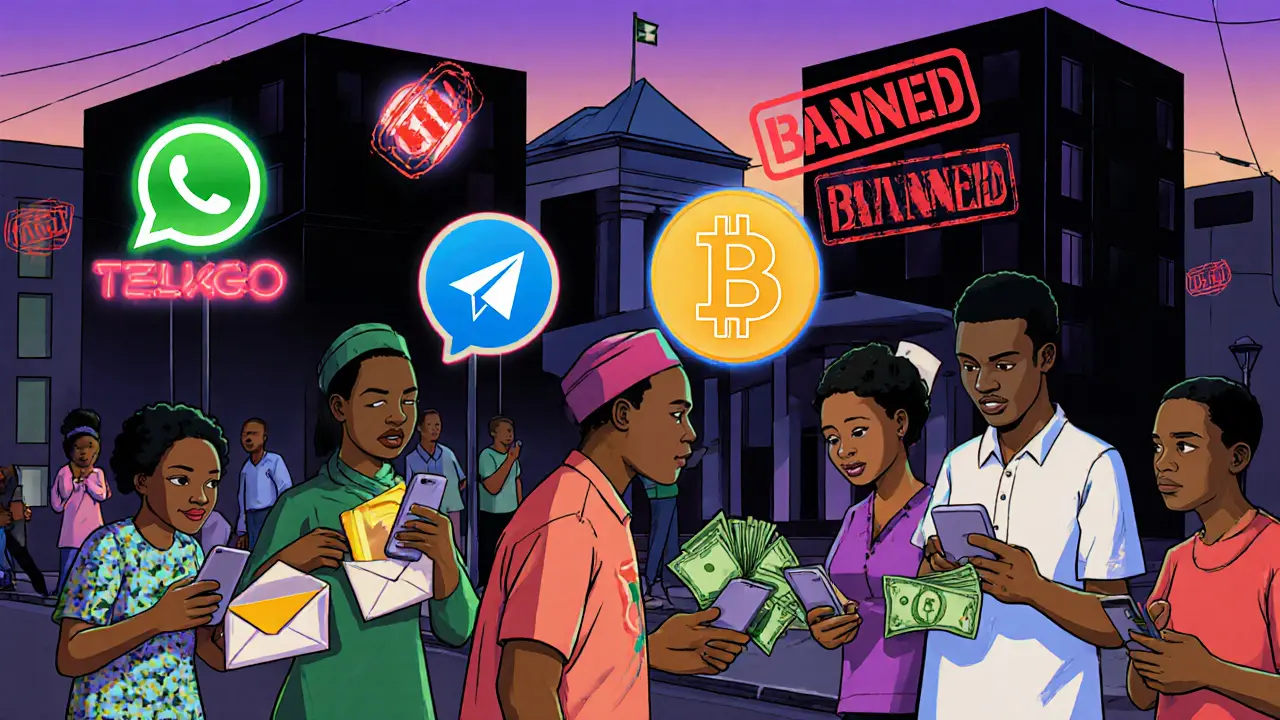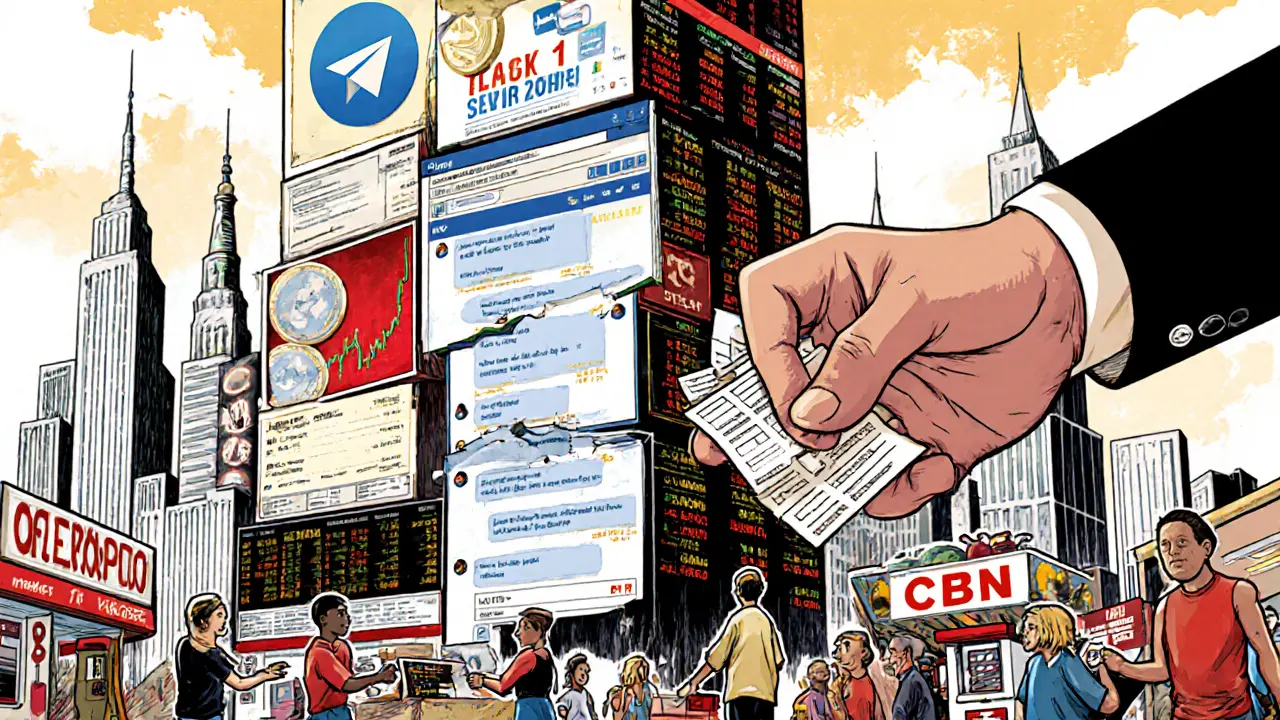How Nigeria’s Underground Crypto Economy Thrived During the Ban
 Oct, 30 2025
Oct, 30 2025
Crypto Investment Calculator
Nigeria's Crypto Growth Calculator
Calculate potential returns based on Nigeria's underground crypto market during the 2021-2022 banking ban. Using data from real traders who turned ₦5,000 into ₦2.3 million in under a year.
When Nigeria’s Central Bank banned banks from handling cryptocurrency transactions in February 2021, most expected digital currency use to collapse. Instead, it exploded. Overnight, millions of Nigerians turned to hidden networks-WhatsApp groups, Telegram channels, and peer-to-peer platforms-to keep trading. The ban didn’t stop crypto. It just pushed it underground, where it grew stronger, faster, and more creative than anyone predicted.
How the Ban Backfired
The Central Bank of Nigeria told banks to cut off accounts tied to crypto exchanges. But it never said individuals couldn’t buy or sell crypto themselves. That loophole became the engine of a national movement. People didn’t wait for permission. They built their own system. By mid-2022, over 1.2 million Nigerians were trading crypto daily on Binance P2P alone, moving around $150 million in naira every month. That’s not a small side hustle-it’s a parallel financial system, built from scratch, with no bank support. What made this possible? Nigerians didn’t rely on traditional banking. They used mobile money, airtime credits, and even cash deposits at local shops. One trader in Port Harcourt told me he’d meet buyers at a gas station, hand over a receipt from a bank teller, and get Bitcoin in return. No bank account needed. Just trust, timing, and a phone.The Tools That Kept Trading Alive
The underground economy didn’t just survive-it evolved. Binance P2P became the lifeline. But it wasn’t enough. People needed ways to verify who was honest. That’s where WhatsApp groups came in. Thousands of them popped up, each with 50,000+ members. They shared blacklists of scammers, posted screenshots of successful trades, and even ran “test trades”-small $5 transactions to check if a seller was real before risking thousands. Telegram became the price board. Traders posted live rates for BTC, USDT, and ETH in naira, updated every 10 minutes. Some groups had bots that auto-updated rates based on global markets. Others had moderators who banned users who posted fake prices. This wasn’t chaos-it was a self-regulating market. Platforms like Paxful and LocalBitcoins saw Nigerian users account for over a third of their global escrow transactions. Escrow systems meant the platform held the crypto until the buyer confirmed payment. If something went wrong, the platform stepped in. But even that wasn’t foolproof. Around 42% of traders reported being scammed at least once during the ban. The community responded by creating the “Naija Crypto Arbitration Group” on Telegram. By late 2022, they were resolving 1,200 disputes a month-no lawyers, no courts, just peer review.
Who Was Trading, and Why?
This wasn’t just tech geeks or investors. It was students, small business owners, and freelancers. A 2022 survey found 68% of traders were under 35. Over 40% were students trying to pay tuition without relying on parents or loans. One Reddit user, LagosTrader87, started with ₦5,000 in March 2021. By December 2022, he had ₦2.3 million-enough to finish university. Small business owners used crypto to import goods. A tailor in Kano bought fabric from China using USDT, avoiding the 30-day wait for bank approvals. A freelance designer in Abuja got paid in Bitcoin from clients in the U.S., then swapped it for naira via P2P. For them, crypto wasn’t speculation-it was survival. The numbers tell the story: Nigeria ranked second in the world for crypto adoption in 2022, behind only Vietnam. Chainalysis recorded $56.7 billion in crypto transactions between July 2021 and June 2022. That’s more than the entire GDP of countries like Ghana or Kenya. And Nigeria’s economy is 10 times bigger than theirs.The Hidden Costs
This system worked-but it wasn’t safe. Over 67% of traders who received crypto payments saw their bank accounts frozen. Banks flagged transfers from P2P buyers as “suspicious.” Some lost access to their life savings for weeks. One woman in Enugu had her account closed after receiving ₦1.2 million from a crypto sale. She had to borrow money just to pay her rent. Fraud was common. Telegram sellers would disappear after receiving naira. WhatsApp “brokers” would fake payment screenshots. The community fought back with reputation systems-traders built trust over dozens of small deals. But for newcomers, the learning curve was steep. Most took 2-3 weeks to learn how to spot a scam. YouTube channels like “Crypto With Tolu” became essential, with over 247,000 Nigerian subscribers by 2023. And then there was the legal gray zone. The CBN never made crypto illegal-but it made it dangerous to use banks. Traders lived in constant fear of being accused of money laundering. In October 2022, the FATF warned Nigeria’s crypto scene was a major risk for illicit finance. The government didn’t act on that warning. But it didn’t stop either.
What Happened After the Ban Lifted
On December 23, 2023, the CBN reversed the ban. Officially, banks could now handle crypto transactions. But the fine print told a different story. The same rules that banned banks from holding crypto still stood. And in February 2024, the SEC banned Binance P2P trading in naira. Why? Because it was too popular. Too efficient. Too hard to control. The underground economy didn’t vanish. It just changed shape. Many traders moved to decentralized exchanges like Uniswap or PancakeSwap. Others kept using P2P, but now with licensed platforms like Quidax and Bundle, which had spent the ban period building their own compliance tools. The old networks still run. WhatsApp groups still share blacklists. Telegram channels still post live rates. The real win? Perception. A 2024 survey found 89% of Nigerians now see crypto as a legitimate financial tool-even if the government doesn’t. That’s not just adoption. That’s cultural change.The Bigger Lesson
Nigeria didn’t win because it had the best tech. It won because it had the most desperate people. When the system failed them, they built something better. No permission. No approval. Just grit. The ban didn’t stop crypto. It exposed how broken the old system was. Banks couldn’t handle remittances. Payments took weeks. Inflation ate savings. Crypto offered speed, control, and access. And once people tasted that freedom, they wouldn’t give it up. Now, as Nigeria prepares to tax crypto profits at 25% starting in 2026, some fear another wave of underground activity. Maybe. But this time, the system is already built. The networks are alive. The trust is earned. And the people? They know how to adapt.Was crypto illegal in Nigeria during the ban?
No. The Central Bank of Nigeria banned banks and financial institutions from facilitating crypto transactions, but individuals were never prohibited from buying, selling, or holding crypto. The ban targeted institutions, not people. This loophole allowed the underground economy to grow legally in practice, even if it operated outside the formal banking system.
How did Nigerians trade crypto without banks?
Nigerians used peer-to-peer (P2P) platforms like Binance P2P, Paxful, and LocalBitcoins. They paid with bank transfers, mobile money, airtime credits, and even cash deposits at shops. WhatsApp and Telegram groups helped verify traders, share prices, and blacklist scammers. Small test trades were common to build trust before larger deals.
Why did Nigeria rank #2 in global crypto adoption?
Nigeria ranked #2 in Chainalysis’ 2022 Crypto Adoption Index because of massive P2P trading volume-$56.7 billion in just one year. High inflation, unreliable banking, and a young, tech-savvy population pushed people to seek alternatives. The ban forced innovation, turning crypto into a necessity for payments, remittances, and savings.
What were the biggest risks of trading crypto underground?
The biggest risks were scams (42% of traders reported at least one), frozen bank accounts (67% experienced this), and legal uncertainty. Since trades were informal, there was no legal recourse if a seller disappeared after receiving payment. Trust was built through community reputation, not contracts or banks.
Is crypto still underground in Nigeria today?
Partly. While licensed exchanges now operate legally, many traders still use P2P networks because they’re faster, cheaper, and more flexible. The WhatsApp and Telegram groups from the ban period still exist. The underground system didn’t disappear-it became part of the mainstream, just quieter.
How did the ban affect Nigeria’s economy?
The ban pushed an estimated $18.3 billion in crypto transactions into the informal economy in 2022-equal to 3.1% of Nigeria’s informal sector. It empowered small businesses, students, and freelancers to bypass broken financial systems. But it also created new problems: bank freezes, fraud, and regulatory confusion. Ultimately, it forced the government to rethink its entire approach to digital finance.
Wayne Overton
October 31, 2025 AT 02:35Cory Munoz
November 1, 2025 AT 06:02Really makes you think about how resilient people are when the system fails them.
Alisa Rosner
November 1, 2025 AT 13:41Telegram price bots?? WhatsApp blacklists?? That's next-level community organizing!!
Also shoutout to Crypto With Tolu!! 247k subs?? ICONIC 😭
Matt Zara
November 2, 2025 AT 13:15They didn't wait for permission. They didn't beg for approval. They just built.
Imagine if every country had this kind of hustle. No banks? No problem. Just find a guy at the gas station who'll swap Bitcoin for cash.
That's not crypto. That's human ingenuity.
MICHELLE SANTOYO
November 2, 2025 AT 19:56The real story? The government didn't lose control. They let it happen so they could later claim they 'saved' the people by regulating it.
And now they're taxing it at 25%? Classic. They let the chaos bloom so they could harvest the fruit.
Lena Novikova
November 4, 2025 AT 15:44Anyone who thinks this is innovation is delusional. It's just people getting scammed faster with more emojis
William P. Barrett
November 6, 2025 AT 11:00No laws. No courts. No banks. Yet people developed reputation systems, arbitration groups, test trades - all self-enforced.
This is what happens when you remove intermediaries: humans become the infrastructure.
It's not crypto that's revolutionary. It's the fact that ordinary people, without training or funding, built a functional economy from nothing.
That’s the real lesson. Not Bitcoin. Not P2P. But the quiet, relentless dignity of people refusing to be powerless.
Saurav Deshpande
November 8, 2025 AT 01:01What if this 'ban' was never real? What if it was staged? To create a false narrative of resistance so they could later monitor and tax every single transaction?
Chainalysis? FATF? SEC? All the same players.
The underground didn't win. It was engineered.
Kevin Johnston
November 8, 2025 AT 03:51Students paying tuition with Bitcoin?? That's next level 💪
Nigeria you're doing god's work
Paul Lyman
November 9, 2025 AT 07:23imagine if we had this in america people wouldnt be so broke
the gas station trades?? bro that's poetry in motion
Olav Hans-Ols
November 10, 2025 AT 02:56People were just trying to survive, and they ended up inventing a new financial language.
Also, shoutout to the random guy in Port Harcourt who did a Bitcoin-for-cash swap at a gas station. That’s the kind of heroism we don’t celebrate enough.
Brian Collett
November 11, 2025 AT 05:17Was it because it worked too well? Or because it bypassed their control? Why does regulation always follow success?
Also, what percentage of those $56B were actual goods/services vs speculative trading?
Frech Patz
November 12, 2025 AT 16:15One must question whether such decentralized systems, while effective, undermine macroeconomic stability and regulatory oversight.
Herbert Ruiz
November 12, 2025 AT 16:58And 42% got scammed? This isn't a movement. It's a disaster dressed up as empowerment.
Dr. Monica Ellis-Blied
November 13, 2025 AT 11:36Empowerment without structure leads to exploitation - and we have seen this play out in 42% of reported scams. True innovation must include safeguards, not just ingenuity.
Jean Manel
November 14, 2025 AT 09:40People didn't 'build a system' - they got desperate and got scammed.
And now you're calling this 'cultural change'? It's just a symptom of a broken country that couldn't even manage its own currency.
Stop glorifying chaos. It's not empowerment. It's survival with extra steps.